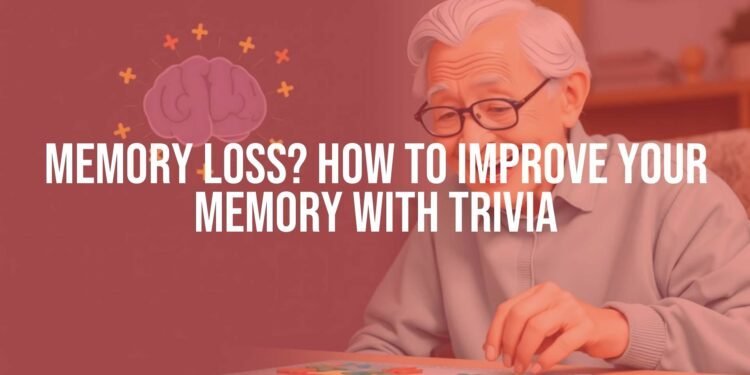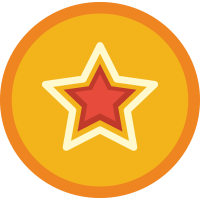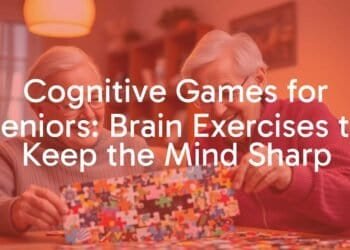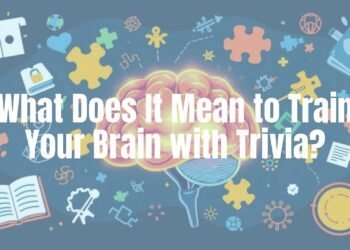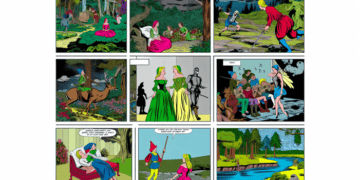Memory loss-when names, dates, or where you left your keys seem to slip away-can get better. A simple, fun way to help is trivia. Answering questions and recalling facts trains your brain, strengthens connections between brain cells, expands what you know, and improves overall thinking skills. This article explains why memory loss happens, how trivia can help slow it, and clear steps to add trivia to your day for lasting gains.
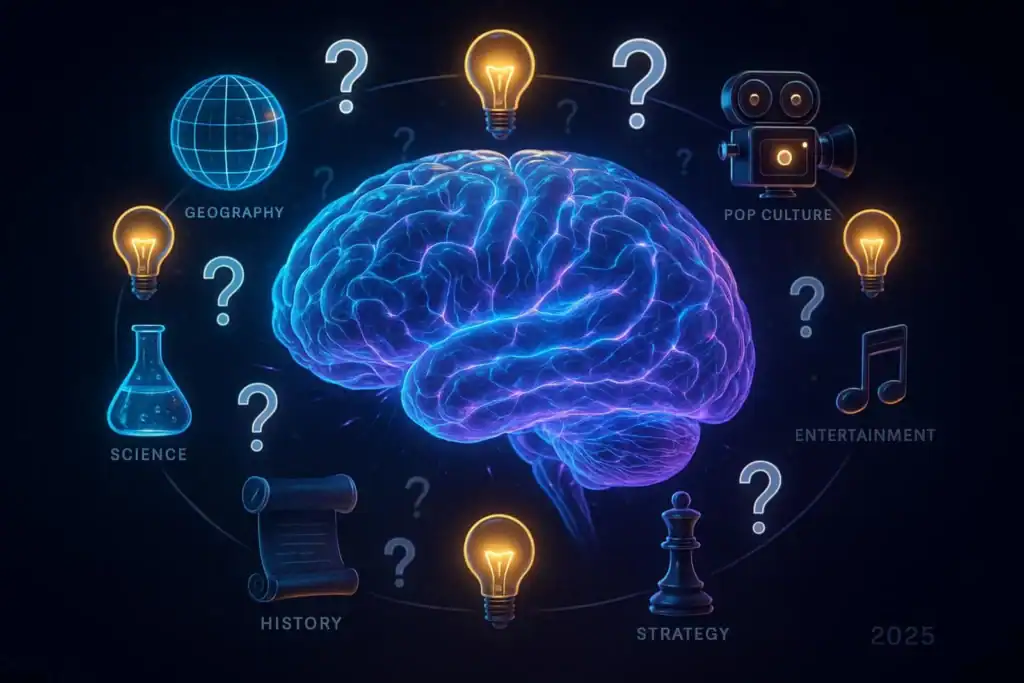
What Causes Memory Loss and How Does It Affect Daily Life?
Memory loss has many causes, from natural aging to health problems. It often builds slowly and can quietly make everyday tasks harder, which can feel discouraging.
Common Types and Degrees of Memory Loss
Memory loss is not the same for everyone. Some people face serious problems tied to diseases like Alzheimer’s and other dementias, which can affect recall, recognizing people, and daily routines. Many others have milder age-related changes, often called age-associated memory impairment, such as misplacing items or struggling to find a word. These smaller slips can still be upsetting and affect confidence.
Your brain stores and recalls information through networks of nerve cells. With age, these networks can work less smoothly. Knowing the different types and levels of memory loss helps you choose good ways to manage and improve them.
Signs and Early Symptoms to Watch For
Spotting early signs helps you act sooner. Occasional forgetfulness is normal, but ongoing problems need attention. Common signs include:
- Forgetting new information or repeating the same questions
- Trouble planning, solving problems, or following steps
- Losing track of dates, time, or seasons
- Struggling with familiar tasks (like a common route or a favorite recipe)
- Misplacing items and not being able to retrace steps
- Changes in mood or personality (confusion, anxiety, pulling away from others)
These signs can also come from other health issues, so see a medical professional for a clear diagnosis.
Risk Factors Influencing Memory Decline
Some things raise the risk of memory problems:
- Older age
- Family history and certain genes
- High blood pressure, diabetes, obesity, high cholesterol
- Little physical activity, poor diet, poor sleep, long-term stress
- Loneliness or low mental stimulation
Helpful habits that may protect memory include:
- Regular exercise and good sleep
- Healthy eating
- Staying mentally active (like trivia)
- Keeping close social ties
These habits can build “cognitive reserve,” which gives the brain a buffer against age-related changes and possible damage.
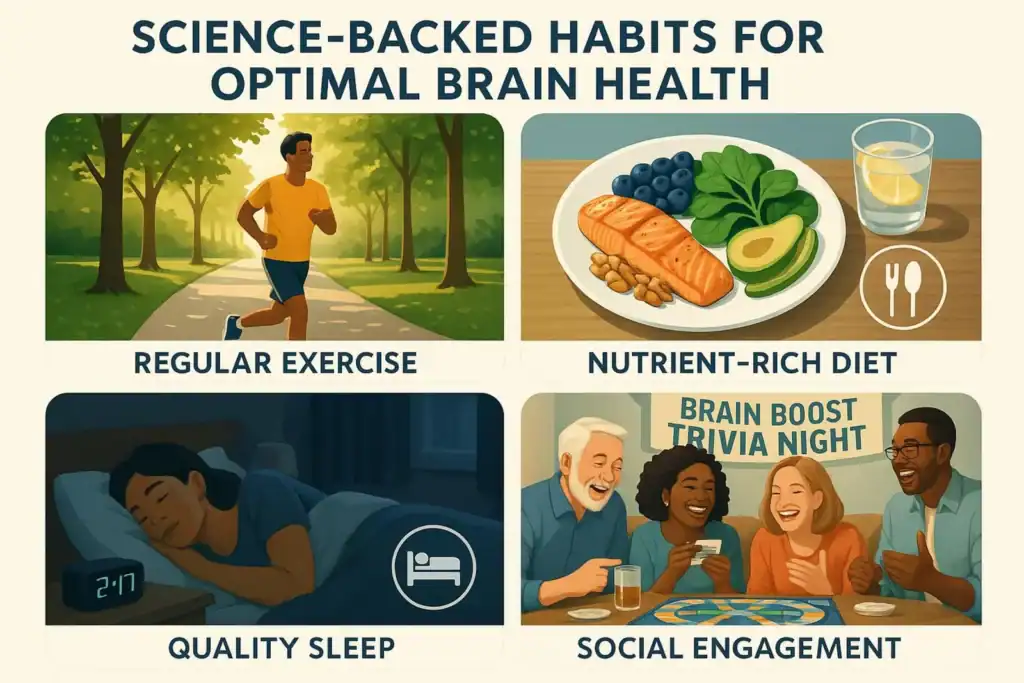
How Trivia Engagement Boosts Memory Function
Now let’s look at trivia as a helpful tool. Trivia is more than a bar game-it is a lively way to wake up your mind and improve brain health.
Mental Stimulation and Neuroplasticity
Trivia is strong mental exercise. It calls on memory, recall, and quick thinking. This kind of challenge helps your brain stay active over time. It supports neuroplasticity-the brain’s ability to form and change connections. When you answer trivia questions across many topics, you train these connections and build your brain’s “backup capacity,” making it more able to handle aging or injury.
Trivia’s Role in Preventing Cognitive Decline
Trivia does more than give you a quick workout. Regular mental activity may help delay memory decline and lower the risk of problems like Alzheimer’s. Keeping your mind busy builds cognitive reserve, which can help your brain work around changes linked to aging or disease. Steady practice with new facts and varied topics adds to this reserve and may slow down memory problems.
Improving Focus and Attention Through Trivia
Trivia demands focus. You need to block out distractions, read the question, and pull the right fact from memory. Repeating this sharpens attention, which helps with learning and recall in daily life. As neuroscientist Lisa Genova says, “The first necessary ingredient in creating a memory that lasts longer than the present moment is attention.” Many “memory problems” are really attention problems. Trivia trains you to pay attention, which sets the stage for stronger memories.
Encouraging Social Interaction and Confidence
Trivia can be a social game, which boosts brain health even more. Talking, laughing, and teaming up with others exercise communication and emotional skills. Getting a tough question right builds confidence and motivation. This good feeling can lower stress and lift mood, which also supports memory. Enjoyment leads to more practice-and more practice supports a healthier brain.

What Are the Main Benefits of Trivia for Memory Health?
Adding trivia to your routine brings many real-life gains. Think of it like a full workout for your brain, training different mental “muscles.”
Knowledge Expansion and Retention
Trivia covers many topics-history, science, pop culture, geography, and more. You keep learning and linking new facts to what you already know. These links create more “hooks” for new information, which makes learning and recall easier.
Strengthening Recall Abilities
Trivia is all about recall. Every question pushes you to pull up names, dates, places, and facts. Like a muscle, memory gets stronger with use. Regular trivia helps both short-term and long-term memory.
Mood and Motivation Boost
Getting an answer right feels good. That win can greatly lift your mood and push you to keep going. Friendly competition-against others or your past scores-adds extra motivation. A better mood can also lower stress, which helps memory.
Reducing Age-Related Memory Issues
Some slowing of memory with age is common. Trivia offers a hands-on way to ease these effects. By keeping brain connections active, steady trivia practice may help slow decline. While it’s not a cure for dementia, it supports a brain that is better prepared for the challenges of aging.
Effective Trivia-Based Techniques to Improve Memory
Ready to get the most from trivia? Don’t just answer questions-use simple methods that make recall stronger and longer-lasting.
Chunking Information for Easier Recall
Chunking breaks big bits of information into smaller, easier pieces. For example, split a phone number into groups: (123) 456-7890. With trivia, group facts by theme or time period. For history, you might sort by era, key people, or region. This reduces overload and speeds recall.
Using Flash Cards and Quick Quizzes
Flash cards are simple and powerful. Monica Thieu, a four-time Jeopardy! contestant, uses cards made from old episodes. Flash cards force active recall: you see a prompt and try to answer before checking. This beats re-reading. Try:
- Pre-test: quiz yourself before learning to see what you already know
- Practice rounds: repeat cards over time to build strong recall
- Target sets: focus on topics like capitals, lakes, or quotes
Pre-testing primes the brain and improves long-term recall.
Creating a Personal ‘Mind Palace’
The “mind palace” (method of loci) links facts to places you know well-your home, a favorite walk, or your commute. Place each fact in a different spot in your mental map. Later, “walk” through the places to pick up the facts. Add clear, emotional, or surprising details to make these links stick.
Paying Attention to Details During Recall
Attention helps memory. When you practice trivia, slow down and notice details: year, people, setting, and cause. If recall feels hard, look closely at your focus. Many times, better attention leads to better memory.
Building Memory-Boosting Habits and Routines
Memory gets better with steady practice. Add trivia to your daily routine:
- One quick quiz with morning coffee
- A short flash card session before bed
- A weekly game night with friends or family
Also, give new facts a “home.” Link them to something you already know or put them in a mental “folder.” The more regular the practice, the more natural recall becomes.
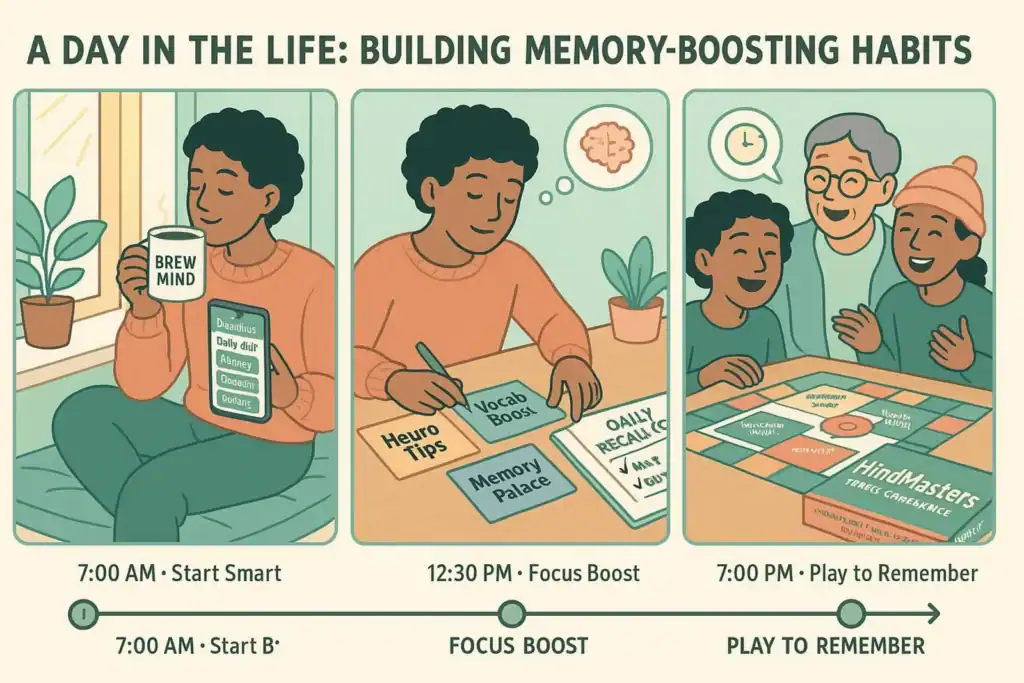
Combining Trivia with Movement or Physical Activity
Mind and body work together. Mix light movement with mental work to help memory. Ideas:
- Walk and quiz yourself out loud
- Do a short set of exercises between rounds
- Try activities like juggling that give “repetition without repetition”
- Make a trivia scavenger hunt that includes light movement
Movement boosts blood flow to the brain and makes learning more active and memorable.
How to Incorporate Trivia into Everyday Life
Trivia fits almost anywhere. You don’t need a formal setup. With a bit of planning, you can place it into daily life at home, at work, or on the go.
Tips for Starting Trivia Sessions at Home or Work
- Use a “question of the day” from a calendar, app, or book
- Set aside 15-20 minutes for a quick game or online quiz
- Make your own flash cards for topics you want to learn
- At work, post a daily question in the break room
- Try a short team quiz at lunch for a fun reset
Keep it regular and fun, not a chore. The goal is steady mental activity, not winning every time.
Making Trivia Accessible for All Ages
- Kids: match questions to their interests and school topics; keep language simple
- Older adults: use clear, simple wording and avoid hard or unclear ideas
- Pick familiar themes (classic films, music from youth, major events) to spark memories
- Add photos or props to trigger recall
Juniper Senior Living suggests using familiar, relatable topics to prompt stories and conversation. Create a safe, welcoming space where everyone can take part.
Involving Friends and Family for Social Benefits
A big plus of trivia is the social boost. Plan regular in-person or online game nights. Mix teams, share knowledge, and cheer each other on. You can also try simple memory games like progressive storytelling, where each person adds a line. Social play builds connection, reduces loneliness, and supports mental health.
Monitoring and Measuring Memory Progress
Track your progress with a simple journal:
- Write your starting strengths and weak spots (idea from memory expert Johannes Mallow)
- Time simple games (like Concentration) to see if you get faster
- Record quiz scores or how often you recall facts without help
- Celebrate small wins; if you see a dip, get curious and adjust your practice
Self-checks help you tune your activities so you keep a steady challenge. If you have worries, talk with family and a medical professional for more help and testing.
Frequently Asked Questions About Trivia and Memory Improvement
Here are short answers to common questions about using trivia to help memory.
Does Playing Trivia Help with Dementia or Alzheimer’s?
Trivia is not a cure, but it can help. Mentally active tasks may delay decline and help the brain keep connections. For people already living with these conditions, trivia can exercise recall, lift mood, and support social time. Caregivers can use simple, familiar topics to spark memories and conversation. Results depend on the person and the stage of the illness, and trivia should be part of a wider care plan.
How Often Should You Play Trivia to See Memory Benefits?
Regular practice works best. Short, frequent sessions beat rare, long ones. Try 10-15 minutes a day, or a few longer games each week. Pick a rhythm you enjoy and can keep up, so it stays positive and useful.
What Are the Best Types of Trivia for Different Memory Goals?
Match your trivia to your goal. Here are examples:
| Memory goal | Trivia focus | Examples |
|---|---|---|
| Build general knowledge and recall | Mixed topics | History, science, pop culture, geography |
| Strengthen semantic memory (facts) | Fact-heavy sets | Capitals, dates, laws of physics, word meanings |
| Support episodic memory (life events) | Reminiscence trivia | Decades you lived through, old TV shows, personal milestones |
| Speed and working memory | Timed questions | Rapid-fire rounds, buzzer games |
| Pattern and sequence skills | Pattern games | Simon, sequence recall, number patterns |
Keep your mix fresh so you don’t go on autopilot. Variety gives a well-rounded brain workout.
Key Takeaways for Using Trivia to Prevent and Manage Memory Loss
Trivia is more than entertainment. It is an easy, enjoyable way to support a healthier brain. By recalling facts, facing new questions, and sharing the fun with others, you train attention, support neuroplasticity, build cognitive reserve, and lift mood-all helpful for memory.
You don’t need hard courses or pricey apps to improve. You can get far with curiosity, regular practice, and shared games. With trivia, you are not just collecting facts; you are shaping a stronger, more flexible mind, ready to handle life’s challenges with more clarity and confidence. Next time a question comes your way, take on the challenge-each answer you find is a step to a sharper, more lively memory.

